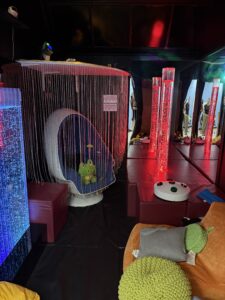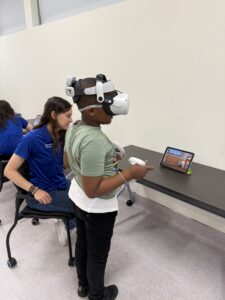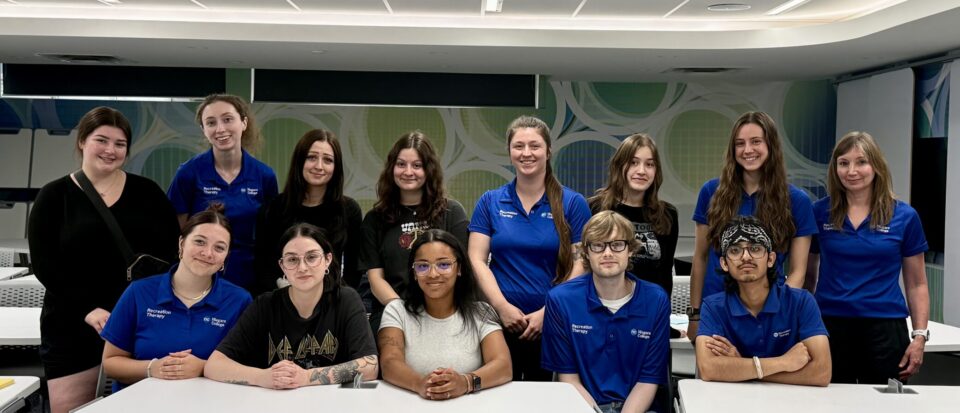In today’s world, technology is playing an increasingly vital role in therapeutic recreation – enhancing engagement, improving accessibility, and increasing the impact of interventions that support physical, cognitive, social, and emotional well-being for people of all ages. On July 9, Recreation Therapy students at Niagara College had the opportunity to combine tech and creativity to deliver meaningful therapeutic activities for children during a special visit from La Boîte à Soleil summer camp.
During their visit to the Welland Campus, campers were able to participate in various therapeutic activities including virtual reality (VR), buddha boards and a robotics lab where they could interact with robotic birds, seals, and HUG – a sensory companion with a heartbeat designed to help with relaxation. Students also had the opportunity to explore the Niagara College Therapeutic Recreation Activity Collective (nc-TRAC), which features two Snoezelen rooms – specialized multi-sensory spaces designed to promote relaxation, reduce agitation and anxiety, and elevate mood through carefully curated sensory experiences.

nc-TRAC’s Snozelen room.
“The primary goal of this partnership was for our students to facilitate and practice the therapeutic use of technology for children in meaningful ways,” said Debbie Fender, Recreation Therapy Professor in the School of Community Services. “Working with campers from La Boîte à Soleil allowed our students to strengthen their skills and confidence in delivering inclusive, engaging programs designed to support children’s well-being while using the skills they have learned in class.”
This experiential learning opportunity reinforced the skills and concepts taught in RECL1310: Technology and Therapeutic Recreation – a third-term course led by Fender that takes an applied approach to developing technology-based knowledge and skills for assessing, planning, implementing, and evaluating therapeutic recreation services, including the use of assistive devices and tech-based interventions.
Rec Therapy students Deondrah Dattilo and Victoria Fair, the opportunity to work directly with children was a highlight of the term. Both self-professed “kid people,” Dattilo and Fair were excited to share their knowledge of therapeutic technology with the campers from La Boîte à Soleil in a fun and safe environment.
“It’s incredible to see just how many possibilities technology offers,” said Fair, a Niagara Region resident. “Recreational therapists can use tech in so many meaningful ways to support physical, emotional, social, cognitive, and even spiritual well-being. Watching the children engage with the activities, build confidence, and have fun was very rewarding.”
Dattilo – who is from Welland – was stationed in the Snoezelen room and witnessed how different sensory stimulations can help regulate individuals with different needs.
“The use of technology doesn’t have to be complicated,” said Dattilo. “Something as simple as dimming the lights, playing calming music and encouraging the use of an emotion cube (a tool designed to help individuals, particularly children, understand and express emotions) can make such a big difference when helping to regulate clients, especially children.”

A child from La Boîte à Soleil summer camp tries out a virtual reality headset.
This partnership with La Boîte à Soleil extends beyond the classroom as students from the Rec Therapy program will visit four of their childcare sites across the region later this summer to deliver mental health workshops to children aged four to eight. La Boîte à Soleil is also actively involved in shaping education at Niagara College, with representatives serving on the Program Advisory Council (PAC) for the Early Childhood Education program.
“We’re so pleased to build a lasting and rewarding partnership with community organizations like La Boîte à Soleil,” said Jackie Frail, Associate Dean, School of Community Services. “It is through these partnerships that our students can apply their knowledge to real-world situations, preparing them for a career in their chosen field.”
Students enrolled in RECL1310 will continue to advance their knowledge on the use of technology when working with an aging population through an upcoming partnership with the Linhaven long-term care home. For two weeks, students will attend class at Linhaven and will participate in workshops on the therapeutic benefits of robotic animals, learning alongside other recreation therapists, gaining valuable knowledge from working professionals.
“Our students are deeply motivated to create meaningful change in the community,” said Fender. “Partnerships like these help them truly understand the impact they can have as Recreational Therapists and the many ways they can support diverse populations. It’s something we can teach in the classroom, but real understanding comes through hands-on experience.”
When asked about the ways in which technology can impact people accessing recreational therapy services, Fair shared the importance of connectivity.
“Technology is incredible because it acts as a bridge, especially for youth and children, helping to build comfort and connection,” she said. “It gives clients something engaging to do with their hands, creating opportunities for interaction, relationship-building, and rapport. It’s a strong foundation to start from in any therapeutic setting.”


